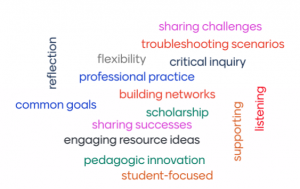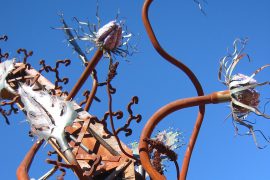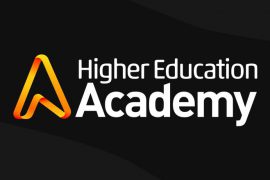Meeting students’ educational needs and expectations requires a strong base of pedagogical knowledge and expert skills in course design, delivery, and assessment. However, developing a strong pedagogic base often falls to a low priority when in the throes of a busy teaching semester. Therefore, it is vitally important that teachers who lead and coordinate teaching and learning have opportunities for education and training to develop professional knowledge and professional practice. This is particularly important for early career academics and new academics to USYD.
Welcome to the Teacher Development Program (TDP)! The TDP provides the opportunity to explore guiding principles and expectations of teachers about how students best learn and how teaching can best support their learning based on current evidence-based research. At the beginning of each semester, we welcome up to 60 teachers from schools and disciplines in the Faculty of Arts and Social Sciences (FASS). Teachers are paid for participating in the TDP, to communicate the value we place on teachers’ time and commitment to their professional development. Across three Friday mornings at the start of the main teaching semesters, we provide a place and space for teachers to engage in critical inquiry and reflection, share best teaching practices, and create new knowledge to advance their professional knowledge and professional practice. Leanne, a TDP co-leader, describes it best:
“The FASS TDP is the keystone of a range of activities we do at a faculty level to support and develop tutors. We all know the value of being able to take time to discuss and reflect on teaching practices and the pedagogical frameworks that shape what happens in the classroom, and the TDP makes the time.”
The TDP is structured so that teachers engage in thought-provoking discussions and activities to spark reflective conversations about their teaching and learning. We explicitly model pedagogic strategies such as ‘Thought bombs,’ ‘Stop and jot,’ ‘Pedagogic storytelling,’ and ‘Progressive brainstorms’ to explore topics such as student engagement, lesson design, social inclusion and diversity, assessment and feedback, and teaching philosophy. These topics are fundamental to creating a culture of excellence in teaching and learning.
Observing and listening to teachers as they talk about and share their professional knowledge and professional practice is a privilege. Teachers generously share innovative tips and tricks for welcoming students into their tutorial rooms and engaging students with hands-on, fun, creative resources. Teachers also spitball ideas and discuss potential solutions to tackle challenging teaching scenarios. The room is full of collegial chatter and laughter, and new friendships are being formed. As one tutor commented, “great sessions and really enjoyed talking to and learning from other tutor(s)” (Economics tutor). Building a community of practice amongst sessional staff “makes the teaching experience feel more connected” (Economics tutor).

After the TDP in Semester 1 2023, we looked carefully at the evaluation feedback from teachers. It was clear that the TDP offered teachers a place and space to come together and talk about and share their teaching and learning expertise and knowledge with others. Teachers valued particular ways of working. To best articulate these ways and formalise a framework for our approach, we created the acronym CARE. Teachers told us that the TDP had helped improve their teaching and learning through CARE.
C: It’s all about chatter, collaboration, and camaraderie – we have a place and space to come together and learn from each other to develop the best teaching and learning practices based on evidence-based strategies and current scholarship. We share successful tips and pedagogic strategies to support a transformational education experience for students.
- 96.7% of teachers responded that the TDP allowed them to have a more robust repertoire of practical teaching and learning strategies for tutorials and lectures.
A: It’s all about teacher agency – we support and encourage ideas, thoughts, perspectives, and opinions to find solutions to manage challenging teaching and learning scenarios. We spitball ideas, talk through options, and problem-solve together.
- 90.1% of teachers responded that the TDP made them feel more empowered and confident to manage challenging teaching and learning situations.
R: It’s all about responsive teaching and learning – we explore ways to adopt a reflective attitude and increase awareness of students’ strengths and interests and how they learn best. We value flexible ways of teaching and learning to meet the needs of students and promote diversity, equity, access, and inclusion.
- 93.3% of teachers responded that the TDP made them feel more knowledgeable about practical ways to respond to their students’ needs.
E: It’s all about maximising student engagement in learning – we discuss and share ways to design flexible teaching places and spaces, promote choice, intellectual challenge, and curiosity, develop strong teacher-student relationships, and embed exciting and innovative resources.
- 96.6% of teachers responded that they feel more empowered and confident in engaging students in learning.
The University Strategy of 2023 has the aspiration of delivering a student-focused education. Meeting this aspiration will require teachers to have a strong base of pedagogical knowledge and expert skills in teaching and learning. The FASS TDP is one way of purposefully supporting this aspiration.
Interested in joining us in Semester 2?
If you are a teacher working in FASS who would like to join us in Semester 2 of 2023, please be on the lookout for an email, ask your coordinator, or contact Leanne Stevenson.





